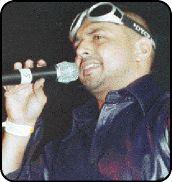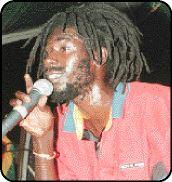

File photos
Sean Paul and Buju BantonTanya Batson & Tyrone Reid, Staff Reporters
Reggae is undeniably one of Jamaica's greatest exports. Many have pointed to the idea that it is one of our greatest gifts to the world (with rum coming close behind).
It is the media by which Jamaicans have lifted our voices and made a rebellious noise, demanding to be heard.
Of course, international success means that language barriers have to be crossed... or do they? Do our musicians simply have to adroitly sidestep language differences, buoyed by the potency of the reggae beat, or will the audience's inability to hear anything more than 'ragga, ragga, ragga, ragga' negatively impact on international sales?
The question of language for reggae and the rest of Jamaica works on several levels. First, there is the question of selling the music to English-speaking nations. Armed with Shakespeare, swords and flags and the knack for talking through both sides of their mouths, the British have made sure that English has been declared the international language.
However, even though we pretend otherwise, it is evident that English is not Jamaica's first language. As such, the language of Jamaicans (patois or creole) is also the language of the people's music. This is especially true where dancehall is concerned. While most of the other genres of Jamaican music largely use English, dancehall does not. As a result, some persons argue that this means that dancehall will have trouble crossing the Caribbean Sea, not to mention the Atlantic and Pacific oceans.
Where English-speaking people can therefore understand reggae, some persons argue, they will not understand Jamaican patois. Despite this, dancehall and its Jamaican patois-slinging deejays have more than made the leap to other English-speaking areas of the world.
On the other hand, there are several countries where English is not the major language spoken. This creates yet another possible barrier to the genre. Additionally, there are sub-markets within English-speaking countries where English is not the 'native' tongue. For example, Sean Paul admitted recently to The Sunday Gleaner that his Spanish version of Punky was created to please the Latin American audience in the United States.
"They 'rail' for the songs but they never understood what I was saying, so this is a way of showing my appreciation for their listenership," he said. The deejay pointed out that his acceptance by the Latin audience was in part due to the fact that he looks Latino. "You see, because of the way me look they always say that I am a Puerto Rican, so they favour me because of that," he explained.
Before Gimme The Light 'ketch a massive fire', Sean told The Sunday Gleaner that the Latin Americans formed the core part of his audience in North America. Having 'got the light', that no longer holds true.
Punky was re-written by Nes, who writes Spanish songs. He has also written songs for Knotch, the singer from the duo Born Jamericans. Knotch was responsible for Nes and Sean hooking up to recreate the song.
Sean indicated that there is a new brand of Spanish dialect developing in America. The song was written in this format so its audience would better identify with it. According to Sean, the project 'broke sweat from his brow' since deejaying in Spanish proved to be harder than he thought.
"Bwoy it surprise me, it took seven hours in the studio trying to get it right as he (Nes) explained it to me. I had the melody down but the problem was how to meld it in. It was quite interesting though, I now have a newfound respect for the Spanish deejays," Sean said.
He admitted that at present he only knows the chorus of the song off-hand but eventually he will learn the verses. He had to be taught the song line by line because he knew nothing about Spanish. That said, he explained he now regrets not taking his Spanish classes in high school more seriously. He offered an apology to Ms. Ricketts, his former Spanish teacher at Wolmer's High School for Boys for his delinquency.
He added that there are plans to release the song as a single in America but does not think that it will be released locally.
Other deejays have also tried their tongue at Spanish. Among this group of semi-bilingual deejays are Buju Banton, Wayne Wonder and Tony Rebel. While Banton's Be My Love Tonight and Wayne's The Best, did only sections of their songs in Spanish, Tony Rebel, like Sean, translated an entire song, If Jah Is Standing By My Side, into Spanish.
In explaining his decision to create the Spanish version of Punky, Sean explained that though the Latin American audience in the United States understood English, they were unable to bend their minds around patois. He added that the fans would sometimes call in to radio programmes featuring him to ask what the tunes meant.
Therefore, it would seem that the Jamaican patois would become even more problematic when English is not a first language for the target audience. Experts in Europe do not agree, however.
Ellen Kohlings, one of the editors of Riddim magazine in Germany, that country's first reggae magazine, argues that she sees no reason for Jamaicans to learn German.
"I would say that the core reggae/dancehall audiences definitely want the artistes to be 'authentic'," she explained. "That means they want and love the Jamaican language. For that reason a lot of 'soundbwoys' try to speak Jamaican," Kohlings added. Of course, like other countries where dancehall has made a great impact, Germany has also produced their own artistes. Kohlings explains that German reggae artistes therefore try to gain authenticity by using smatterings of Jamaican patois in their work, creating a musical 'Jamgerman'.
France is also making quite a home for reggae. Bruno Blum, French journalist and musicologist, in a Reggae Studies Unit lecture at the University of the West Indies in February of this year, discussed reggae's appeal to the French.
Blum has published two books on the historical development of reggae, Le Reggae and Couleurs Reggae (Reggae Colours). Currently, as Mr. Blum points out, reggae sales in France are far greater than reggae sales locally. Mr. Blum noted that reggae appeals to the French because its revolutionary 'get up, stand up' nature.
Even so, he pointed out that the language barrier, even in the heyday of Bob Marley, did create some misunderstandings. To explain, he pointed to Bob Marley's No Woman No Cry, which he argued that many French men interpreted to mean that if you have no woman, you have no reason to cry, and thus it was very popular with the broken-hearted.
A quick search on-line shows that reggae is quite prominent in France. Websites such as Jahmusic.net provide listings of reggae charts as well as concerts, interviews and other bits of information. The site boasts three charts, including the currently dormant Weekend Star charts.
Chez.com provides a variety of reggae information, including short biographies of reggae legends including Bob Marley, U-Roy, Peter Tosh, and Burning Spear.
The same phenomenon has taken place in Japan, another great marketplace for reggae. According to an article which appeared recently in the Daily Yomuiri, Paul Jackson investigated the rebirth of reggae in Japan, as signified by the return of 'Japansplash' last summer, featuring Beres Hammond, Marcia Griffiths and Admiral Bailey among others. During its heyday, the outdoor festival reportedly featured crowds as large as 40,000 persons.
However, according to Jackson, Jamaican reggae acts are no longer dominating the reggae scene in Japan. Japanese reggae artists now dominate the reggae music scene. According to Jackson, the stores are dominated by names such as Mighty Crown, Mikidozan, Fireball, Pushim, Moomin, Nahki, Rankin Taxi and the Boogie Man. Nahki, Rankin Taxi and Boogie Man are three of the veterans of Japanese reggae.
The article also suggests, through Nahki, that reggae has undergone a rebirth in Japan in part because of the greater use of Japanese in the genre, with only a smattering of Jamaican involved. In the earlier years, Japanese reggae acts would spend up to years at a time in Jamaica attempting to perfect their Jamaican, the article suggests. With the greater acceptance of reggae in Japanese now, that is no longer necessary, Jamaican patois now becoming more of a 'decorative element'.
Jackson's article also points to the fact that Japanese reggae artistes outsell Jamaican artistes by far, making sales of over 100,000 records in Japan, while Jamaican artistes come nowhere close to that figure. Even so, it is believed that Jamaican reggae acts, with the strength of persons such as Beres Hammond and Marcia Griffiths, can bring Jamaican reggae back to the mainstream in that nation.
The trend of non-Jamaican artistes taking the genre into their native language is not confined to Japan. Kohlings points to the fact that German reggae artistes who deejay in German are accepted. Artistes from Germany also improve their authenticity by learning Jamaican patois. Kohlings explains that one of Germany's best deejays, Gentleman, has such a good grasp of patois, that the German audience accepts his use of the dialect.
It should also be noted that the present global trend for music is constantly rendering the question of understanding the artiste moot. While Shaggy is our current great crossover success, Bounty Killer's work, or Shabba's before him, cannot be ignored. Kohlings argues that Bounty Killer is considered to be one of, "the few artistes that does not have to change his style." His multiple collaborations, especially Hey Baby with No Doubt, seems to confirm this.
Of course, when it comes to the matter of intelligibility, one cannot ignore the current crop of rappers who are spewing forth from the bowels of the southern states in the United States. One can honestly be befuddled by what on this side of heaven is Bubba Sparks, Nelly, Ludacris, and Mystikal are saying. Before these rappers came on the scene, many English-speaking persons outside of Bubba of Forrest Gump had never heard the words 'scerred' and 'r'night'. The lyrics from these top rappers have become a crash course in Ebonics.
Additionally, if in the face of the rocket power behind Gimme Di Light can allow us to admit the truth, who understands what Sean Paul was saying when the song just broke? In fact more than a few people are still probably stumped by what is the last word in the first line of his song. Nonetheless, understood or not, it has certainly made the break.



















